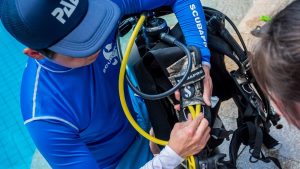The Importance of Dive Briefing: Ensuring Safety and Enjoyment Underwater
Diving is an exhilarating experience, offering a unique glimpse into the underwater world. However, with this adventure comes the responsibility of ensuring safety for all participants. This is where dive briefings come into play. A well-conducted dive briefing is crucial for a successful dive, and here’s why it matters.
1. Safety First
The primary purpose of a dive briefing is to prioritize safety. It allows instructors or dive leaders to communicate essential safety protocols, such as emergency procedures, equipment checks, and specific potential hazards in the dive site. By ensuring that all divers are aware of these protocols, the likelihood of accidents or emergencies decreases significantly.
2. Clarifies Objectives
A dive briefing outlines the goals and objectives of the dive. Whether it’s exploring a wreck, observing marine life, or conducting research, understanding the purpose of the dive helps divers stay focused. Clear objectives ensure that everyone is on the same page and can contribute to a more coordinated and enjoyable experience.
3. Fosters Team Cohesion
Diving is often a group activity, and a briefing helps build camaraderie among divers. By discussing roles and responsibilities, divers can establish trust and cooperation. This teamwork is essential, especially during challenging conditions or emergencies, where clear communication can make all the difference.
4. Addresses Individual Needs
Each diver has different levels of experience, comfort, and ability. A dive briefing is an opportunity to assess these differences and tailor the dive plan accordingly. Instructors can address specific concerns or questions from divers, ensuring that everyone feels confident and prepared for the dive ahead.
5. Highlights Environmental Awareness
Responsible diving includes respecting the underwater environment. Briefings often cover guidelines for marine conservation, such as avoiding contact with fragile ecosystems and not disturbing marine life. Educating divers about their impact helps promote sustainable practices, ensuring that these underwater wonders remain protected for future generations.
6. Equipment Familiarisation
During a dive briefing, instructors can ensure that all divers are familiar with their equipment. This includes checking that everyone knows how to operate their gear, understanding dive computers, and recognizing signs of equipment failure. A thorough equipment check during the briefing can prevent issues underwater, enhancing overall safety.
7. Encourages Communication
Effective communication is vital in diving. Briefings set the stage for establishing signals and methods of communication underwater, ensuring that divers know how to convey important messages or emergencies. This preparedness enhances the overall diving experience and promotes safety.
Conclusion
Dive briefings are an integral part of any diving experience, serving as a foundation for safety, enjoyment, and environmental stewardship. By taking the time to conduct thorough briefings, instructors and dive leaders set the stage for a successful dive, fostering a culture of safety and awareness among all participants. As divers, it’s essential to appreciate the value of these briefings, recognizing that they contribute not only to our safety but also to the preservation of the incredible underwater world we seek to explore. So before you take the plunge, remember: a well-briefed dive is a safe and enjoyable dive!







